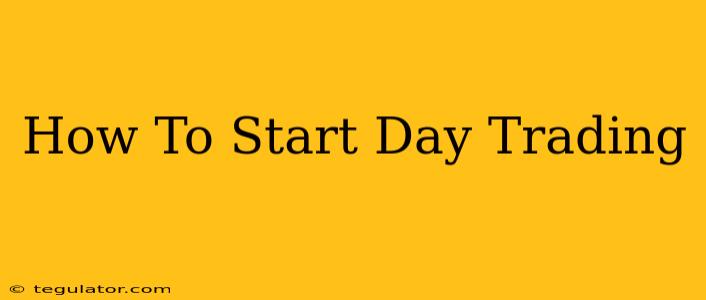Day trading, the practice of buying and selling financial instruments within the same trading day, can be incredibly lucrative but also carries significant risk. This comprehensive guide will walk you through the essential steps to get started, focusing on responsible practices and risk management. Before you dive in, remember that day trading is not a get-rich-quick scheme; consistent success requires dedication, discipline, and a thorough understanding of the market.
1. Education is Key: Mastering the Fundamentals
Before even thinking about placing your first trade, you need a solid foundation in financial markets. This isn't about memorizing formulas; it's about understanding how the market works.
Essential Knowledge Areas:
- Market Mechanics: Learn about order types (market orders, limit orders, stop-loss orders), trading platforms, and the process of executing trades.
- Technical Analysis: This involves using charts and indicators to identify trading opportunities based on price patterns and volume. Familiarize yourself with common indicators like moving averages, RSI, and MACD.
- Fundamental Analysis: While less crucial for day trading than technical analysis, understanding a company's financial health can inform your trading decisions, especially if you're trading stocks.
- Risk Management: This is arguably the most important aspect of day trading. Learn about position sizing, stop-loss orders, and how to manage your risk tolerance. Never risk more than you can afford to lose.
Resources for Learning:
- Online Courses: Many reputable platforms offer courses on day trading. Look for courses that emphasize risk management and practical application.
- Books: Numerous books delve into the intricacies of day trading strategies and market analysis. Choose books written by experienced traders with proven track records.
- Trading Simulators: Practice trading with virtual money before risking real capital. This allows you to test strategies and refine your skills without financial consequences.
2. Choosing a Broker and Platform
Your broker is your gateway to the markets. Selecting the right one is crucial for a smooth and efficient trading experience.
Key Considerations When Choosing a Broker:
- Trading Platform: The platform should be user-friendly, reliable, and offer the tools you need for technical analysis.
- Fees and Commissions: Compare brokerage fees, including commissions, inactivity fees, and data fees.
- Account Minimums: Some brokers require minimum account balances to open an account.
- Customer Support: Ensure the broker offers responsive and helpful customer support.
3. Developing Your Trading Plan
A well-defined trading plan is your roadmap to success. It should outline your trading strategy, risk management rules, and goals.
Components of a Robust Trading Plan:
- Trading Strategy: Define your specific approach, whether it's based on technical analysis, fundamental analysis, or a combination of both.
- Entry and Exit Rules: Specify the precise conditions under which you'll enter and exit trades.
- Risk Management Rules: Determine your maximum loss per trade and your overall risk tolerance. Stick to these rules religiously.
- Record Keeping: Maintain a detailed record of all your trades, including entry and exit points, profits and losses, and reasons for each decision. This will help you learn from your mistakes and improve your performance.
4. Practice and Patience
Day trading requires consistent practice and patience. Don't expect to become profitable overnight. Start with paper trading (simulated trading) to hone your skills and test your strategies before risking real money.
Important Reminders:
- Start Small: Begin with a small amount of capital to minimize potential losses during your learning curve.
- Manage Emotions: Fear and greed can be your worst enemies. Stick to your trading plan and avoid impulsive decisions.
- Continuous Learning: The market is constantly evolving. Stay updated on market trends and continue learning to improve your skills.
5. Seeking Professional Advice (Optional but Recommended)
Consider consulting a financial advisor before starting day trading. They can provide valuable insights and help you create a personalized financial plan that aligns with your goals and risk tolerance.
Disclaimer: This information is for educational purposes only and does not constitute financial advice. Day trading involves significant risk, and you could lose all of your invested capital. Always conduct thorough research and consult with a qualified financial advisor before making any investment decisions.

